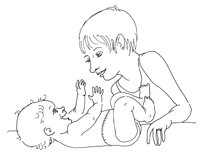STRANGE BUT TRUE- Hideous parents? Your newborn won't mind

DRAWING BY DEBORAH DERR McCLINTOCK
Q. New Moms and Dads, what does Baby think of your face? How could you tell? –J. Fariello
A. Innocent-looking Big Eyes peering back up at you from the crib is making looks judgments similar to those in the hottest meat-market pickup bars, says University of Texas psychologist Judith Langlois. Pretty pleases, even infants, who will gaze longer at attractive strangers and smile more.
But a second feature of looks is familiarity. Babies of facial 1's are no less happy with mommy and daddy than babies of facial 10's, because they grow accustomed to the loving faces they see, just as most of us grow to accept our own dazzling or un-dazzling mug in the mirror.
Q. Lovely moonlit night has you and your sweetheart out in the backyard enjoying the sight. Suddenly she takes several steps away from you and bends over, peering out horizontally through her legs. No, she's not "mooning" you, so what is she up to? –B. Spears
A. She says she's out to defeat the ancient, well-known "moon illusion," the most striking illusion in the natural landscape. This is the apparent enlargement of the moon when it's near the horizon, appearing about 50 percent bigger than when it's overhead, explains Jearl Walker in The Flying Circus of Physics.
Actually, the moon always occupies about half a degree in our view, so the illusion is psychological. Its primary cause seems to be that we associate a low moon with the terrain in front of us, and based on contrast with the terrain, the moon looks bigger.
Now you join your lover, turning around and bending over as well. Looked at this way, the moon does indeed appear its normal size, presumably because the terrain, being in the top half of your view, is no longer used for scaling. There are other possible causes as well, but they pale before the charm of the evening.
Q. Why do we humans kiss with our lips? –A. Jolie
A. Actually, it's deeper than a lip thing. As with much of human life, the brain's the game, or more precisely the sensory cortex, says David Myers in Psychology in Everyday Life. The more sensitive a body region, the larger the cortical area devoted to it (even true of rat whiskers and owl ears). "Your supersensitive lips project to a larger brain area than do your arms. That's one reason we kiss with our lips rather than rub elbows," Myers says. The brain also devotes more tissue to regions requiring precise control, including the fingers and, of course, those smartly puckerable lips of yours.
Q. Two timely curiosities: What was perhaps the weirdest thing to happen to you on your last airplane flight– though if you noticed it, that would be weirder still? And can you name a single thing that the dinosaurs did 24/7? –O. Wright
A. Albert Einstein showed that gravity slows the passage of time, meaning that when you fly at high altitudes, Earth's slightly weaker pull causes you to age a few extra nanoseconds during the flight, says LeeAundra Temescu in Discover magazine. As for the dinosaurs, they didn't do anything 24/7 because days back then were only about 23 hours long due to tidal friction from the sun and moon slowing the rotation of the Earth and increasing the length of a day by three milliseconds per century. Therefore, those hungry beasts may have been on the lookout for their next meal only 23/7.
~
Send Strange questions to brothers Bill and Rich at [email protected].
#